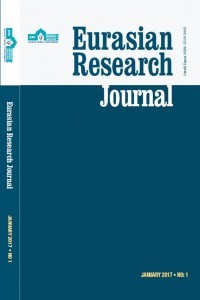BROKEN DREAMS IN ASHKHABAD: AN OVERVIEW OF TURKMENISTAN’S POST-INDEPENDENCE POLITICAL CONTRADICTIONS AND THE CHALLENGES OF CENTRAL ASIAN MIGRANTS IN RUSSIA
BROKEN DREAMS IN ASHKHABAD: AN OVERVIEW OF TURKMENISTAN’S POST-INDEPENDENCE POLITICAL CONTRADICTIONS AND THE CHALLENGES OF CENTRAL ASIAN MIGRANTS IN RUSSIA
This article presents a discussion on olitical contradictions of post-independence Turkmenistan. As part of a broader effort to understand the social and power dynamics resulting from the collapse of the Soviet Union, we apply a descriptive analysis of the principal domestic and foreign policy events involving the Ashkhabad government, as well as the implications for the lives of Turkmen migrants in Russia, who have chosen to leave their country of origin in search of better opportunities. The current paper suggests that Turkmenistan not only became a laboratory for the exercise of a local version of a ‘Cult of Personality’ of the leader, but also precariously operationalized its political neutrality due to economic dependence on Moscow and, more recently, on China. Regarding Turkmen migrants abroad, we evidence their difficulties of assimilation in Russia, due, in part, to a ‘stereotyped’ view about migrants on the part of Russian population.
___
- Arendt, Hannah (1948). The Origins of Totalitarianism. United States of America: Harcourt Brace and Company.
- Berdyeva, Aisha (2010). Drug Addiction in Turkmenistan is on the Scale of a National Disaster. Retrieved from https://p.dw.com/p/QhKL. Accessed: 11.11.2020.
- Bezerra, Valdir (2019). “De Volta para o Passado: A Aproximacao de Putin com a Igreja Ortodoxa Russa e a Retomada da Religiao como Fator de Identidade Regional” (Back to the Past: Putin’s Approach to the Russian Orthodox Church and the Resumption of Religion as a Factor of Regional Identity). Revista Intellector No. 31. pp. 48-58.
- British Petroleum (2020). Statistical Review of World Energy 2020. Retrieved from https://www.bp.com/content/dam/bp/business-sites/en/global/corporate/ pdfs/energy-economics/statistical-review/bp-stats-review-2020-full-report.pdf. Accessed: 22.11.2020.
- Burke, Justin (2014). Post-Soviet World: What You Need to Know About The 15 States. Retrieved from https://www.theguardian.com/world/2014/jun/09/-spprofiles-post-soviet-states. Accessed: 15.11.2020.
- Freire, Maria Raquel (2008). As Eleicoes Presidenciais na Rússia: Continuidade na Mudanca (Presidential Elections in Russia: Continuity in Change). Retrieved from https://estudogeral.sib.uc.pt/jspui/bitstream/10316/9605/1/MRFreire_OccasionalPaper32_IPRI_2008.pdf Acesso em: 26.nov.2016. Accessed: 10.10.2020.
- Gazprom.kz (2003). Gazprom Signed a Long-Term Contract for the Purchase of Turkmen Gas. Retrieved from https://www.gazprom.ru/press/news/2003/april/ article54360/. Accessed: 10.11.2020.
- Gorenburg, Dmitry (2014). External Support for Central Asian Military and Security Forces. Retrieved from https://www.sipri.org/publications/2014/working-paper/external-support-central-asian-military-and-security-forces. Accessed: 21.11.2020.
- Horák, Slavomir (2014). Challenges from the East: China. In: Cornell, Svante E; Starr, Frederick S (org.). Putin’s Grand Strategy: The Eurasian Union and Its Discontents. Singapore: Central Asia-Caucasus Institute e Silk Road Studies Program, pp. 166-177.
- Huntington, Samuel P. (1984). “Will more countries become democratic?” Political Science Quarterly 99(2): 193–218.
- Huntington, Samuel P (1996). O Choque de Civilizacoes: e a Recomposicao da Ordem Mundial (The Clash of Civilizations: and the Recomposition of the World Order). Rio de Janeiro: Editora Objetiva.
- Iandoli, Rafael (2017). Quais os Cálculos Políticos de Putin na Reacao ao Atentado no Metro de Sao Petersburgo? (What are Putin’s political calculations in response to the attack on the Saint Petersburg metro?). Retrieved from https://www.nexojornal.com.br/expresso/2017/04/05/Quais-os-c%C3%A1lculos- de-Putin-na-rea%C3%A7%C3%A3o-ao-atentado-no-metr%C3%B4-de-S%C3%A3o-Petersburgo. Accessed: 16.11.2020.
- Kazantsev, Andrei (2008). “Russian Policy in Central Asia and the Caspian Sea Region”. Europe-Asia Studies 60(6): 1073-1088.
- Kotkin, Stephen (2002). Trashcanistan: A Tour through the Wreckage of the Soviet Empire. The New Republic. Retrieved from http://stephenkotkin.com/ articles/trashcanistan-a-tour-through-the-wreckage-of-the-soviet-empire/. Accessed: 22.11.2020.
- Kramer, Andrew E. (2017). The Phrase Putin Never Uses About Terrorism (and Trump Does). Retrieved from https://www.nytimes.com/2017/02/01/world/europe/ vladimir-putin-donald-trump-terrorism.html. Accessed: 15.12.2020.
- Lenta.ru (2005). Turkmenbashi zakryl vse bol’nitsy i biblioteki v provintsii (Turkmenbashi Closed all Hospitals and Libraries in the Province). URL: https://lenta.ru/news/2005/03/01/hospital/. Accessed: 13.11.2020.
- Levada Analytical Center (2017). Russian Public Opinion 2017. Moscow.
- McFaul, Michael (2005). “Transitions from Post-Communism”. Journal of Democracy 16(3): 5-19.
- Nezavisimaya Gazeta (2016). President Berdimuhamedov Becomes Life-Long: The Head of Turkmenistan Thinks about Creating a Ruling Dynasty. Retrieved from https://www.ng.ru/cis/2016-09-14/7_turkmenia.html. Accessed: 19.11.2020.
- Observatory of Economic Complexity (n/d). Where Does Turkmenistan Export to? Retrieved from https://oec.world/en/visualize/tree_map/hs92/export/tkm/ show/all/2018/. Accessed: 15.12.2020.
- OSCE (2017). Turkmenistan Presidential Election 11 February 2007: OSCE/ODIHR Needs Assessment Report. Warsaw. Retrieved from https://www.osce. org/files/f/documents/0/e/23722.pdf. Accessed: 05.11.2020.
- Paramonov, Vladimir and Alexey Strokov (2008). The Evolution of Russia’s Central Asia Policy. Defence Academy of the United Kingdom. Retrieved from https://www.files.ethz.ch/isn/92594/08_June.pdf. Accessed: 12.11.2020.
- Pokazhite Ikh Zhivymi! (2019). List of Disappeared in Prisons of Turkmenistan: September 2019. Retrieved from https://provetheyarealive.org/wp-content/ uploads/2019/09/List-of-the-Disappeared-in-Turkmen-Prisons_Sept-2019_RU.pdf. Accessed: 11.12.2020.
- Radio Liberty (2018). Radio Liberty: Turkmen Residents Under 40 Were Banned from Leaving the Country. Retrieved from https://meduza.io/news/2018/06/28/ radio-svoboda-zhitelyam-turkmenii-molozhe-40-let-zapretili-vyezd-iz-strany. Accessed: 07.11.2020.
- Ria Novosti (2006). “Ruhnama” of Turkmenbashi: Read Three Times and Go to Heaven. Retrieved from https://ria.ru/20061222/57559810.html. Accessed: 17.11.2020.
- Starr, Frederick S. (2014). Uzbekistan and Turkmenistan: Staying Away. In: Cornell, Svante E. and Frederick S. Starr (org.). Putin’s Grand Strategy: The Eurasian Union and Its Discontents. Singapore: Central Asia-Caucasus Institute e Silk Road Studies Program, pp. 156-165.
- Tibi, Bassam (2018). “Islamist Parties and Democracy: Why They Can’t be Democratic”. Journal of Democracy 19(3): 43–48.
- U.S. Energy Information Administration (2018). International: Turkmenistan. Retrieved from https://www.eia.gov/international/overview/country/TKM?pa= 12&u=0&f=A&v=none&y=01%2F01%2F2018. Accessed: 15.11.2020.
- Weitz, Richard (2014). The Customs Union and Eurasian Union: A Primer. In: Cornell, Svante E. and Frederick S. Starr. Putin’s Grand Strategy: The Eurasian Union and Its Discontents. Singapore: Central Asia-Caucasus Institute e Silk Road Studies Program, pp. 29-39.
- World Atlas (2019). Religion in Turkmenistan. Retrieved from https://www.worldatlas.com/articles/religion-in-turkmenistan.html. Accessed: 10.12.2020.
- World Bank (2017). Migration and Remittances Data. Retrieved from https://www.worldbank.org/en/topic/migrationremittancesdiasporaissues/brief/migration- remittances-data. Accessed: 15.12.2020.
- ISSN: 2519-2442
- Yayın Aralığı: Yılda 4 Sayı
- Başlangıç: 2019
- Yayıncı: Hoca Ahmet Yesevi Uluslararası Türk-Kazak Üniversitesi
